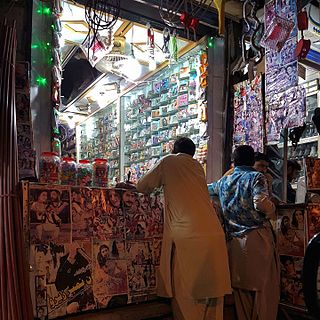Daud Kamal ) was a Pakistani poet who wrote most of his work in the English language.

The Pashto media includes Pashto literature, Pashto-language newspapers, magazines, television and radio stations, as well as Pashto films and Pashto internet. Pashto media involves the Pashtuns of Pakistan, Afghanistan and the Pashtun diaspora around the world.

Pashto cinema, refers to the Pashto-language film industry of Pakistani cinema based in Peshawar, Khyber Pakhtunkhwa, Pakistan.

Ustad Khyal Muhammad is a Pashtun singer from Khyber Pakhtunkhwa, Pakistan. He has appeared regularly on television, usually singing ghazals and in movies.
Sardar Ali Takkar in Takkar village Mardan is a Pakistani Pashto singer. He primarily sings the poetry of renowned Pashto poet Ghani Khan. Takkar is a graduate of the University of Engineering and Technology in Peshawar, Pakistan. In recognition of his services to the field of music, the President of Pakistan bestowed him the Pride of Performance Award. On 23 March 2019, Takkar became a recipient of Tamgha-e-Imtiaz award for the recognition of his "services rendered for Pashto music". It was presented by the President of Pakistan.
Mohammad Rafiq Shinwari was a singer and composer of Pashto music. Though he also tried his luck with Pashto poetry and wrote a few poems as well but it was his compositions for early Pashto movies that earned him a big name in this field.
Karkhano is a market area on the western side of Peshawar, Khyber Pakhtunkhwa, Pakistan. Located in the Hayatabad suburb of the city, it is located near the Khyber District, which in turn borders Afghanistan. It is considered to be the largest business hub in Peshawar.
Mehnaz, known professionally as Gul Panra, is a Pakistani folk singer and touring artist, mainly associated with Pashto language music industry. Her live concerts are famous in Pakistan and she has also performed in the United Kingdom and Afghanistan. She has been serving as a brand ambassador of her home cricket team Peshawar Zalmi in Pakistan Super League, and has sung several anthems for the team since its inception in 2016.

Fazal Malik Akif is a Pakistani singer and songwriter, who gained popularity in the 1970s for introducing a modern and eclectic twist to traditional Pashto folk compositions. He is widely regarded as the first "pathan pop star" for collaborating indigenous instruments such as the rubab, harmonium and tabla with contemporary synthesizers, accordion, drums and electric guitar. He typically sang in his native language of Pashto, but his repertoire extends to Urdu, Punjabi, Hindko, Sindhi, Balochi, Saraiki and Farsi.

The Qasim Ali Khan Mosque ; is a 17th-century mosque in Peshawar, Khyber Pakhtunkhwa, Pakistan. Located in Qissa Khwani Bazaar, Mohallah Baqir Shah. The mosque was built during Emperor Aurangzeb's reign, by Qasim Ali Khan, a news writer and administrator in the government of Kabul. The mosque is situated in the Misgaran Qissa Khwani Bazaar.
Ismail Shahid is a Pakistani TV actor, producer, director and comedian. He is best known for his comic performances in Pashto and Urdu dramas like, "Meem Zar Ma" Or it's Urdu remake "Jhoot Ki Aadat Nhi Mujay" and "Rang Pa Rang".
Abaseen Yousafzai is a Pakistani Pashto and Urdu language poet. He joined the Islamia College University as a lecturer of Pashto in 1993. and is the chairman of the Pashto Department at the University. Yousafzai has had his poetry published across the Durand Line.

Haroon Bacha is a Pashtun singer and composer who, since beginning his musical career in 1992, has released upwards of 50 albums and numerous singles. Bacha is renowned for songs such as "Awal Ba Kala Kala Gham Wo" and "Stergey Ghazal".
Nishterabad, also spelled as Nishtarabad, is a residential neighbourhood in Peshawar, located in Khyber Pakhtunkhwa province, Pakistan. It is bordered by Hashtnagri to the west and Gulbahar to the east.
Mohammad Ghazi, known by his pen name Ghazi Sial and by an honorific title in Pashto literature as Baba Sandara, was a Pakistani poet and Pashto folk song writer. He wrote sixteen books in Pashto language.

Hidayatullah, was a Pakistani Pashto folk musician, playback singer and touring artist who primarily sung multilingual songs in numerous regional languages such as Pashto, Urdu, Hindko, Punjabi, and in Persian language. His live concerts include Europe, U.S., UAE and in 1969 or earlier, he was invited by an Afghan king Mohammed Zahir Shah to Kabul as a state guest and named him "Mohammed Rafi of Pashto".
Bacha Zareen Jan, known by her pen name Bibi Gul, also by the honorary title "Queen of Pashto Ghazals", was a Pashto multilingual Pakistani gazal singer, lyricist and musician who primarily sung songs in different languages such as Persian, Hindko, Punjabi, Seraiki, Urdu and predominantly in Pashto language.

Mashooq Sultan, was a Pakistani folk singer and the former actress. The recipient of numerous accolades, including, a highest national literary award of Pakistan the Pride of Performance, she is sometimes referred to as "Melody Queen of the Pashto folk music" for her contributions to Pashto music and "Queen of the stage" for representing Pakistan in numerous foreign countries such as the US, the UK, France, Belgium, the UAE and in Afghanistan. As a multilingual singer, she worked in 1,500 albums written in different regional languages such as Urdu, Punjabi, Saraiki and primarily in Pashto language. She is also credited for singing gazals, and also worked as a playback singer in Pashto films.








